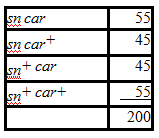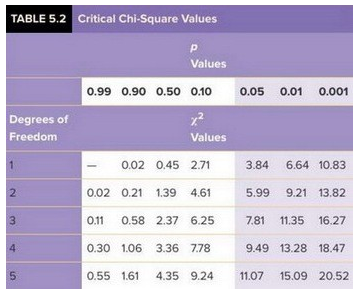When the conditions of the Hardy-Weinberg equilibrium are met (select all correct choices),
A. evolution occurs.
B. evolution does not occur.
C. gene frequencies in the population change
over time.
D. gene frequencies in the population do not
change over time.
E. none of these occur when conditions of the
Hardy-Weinberg equilibrium are met.
B,D
You might also like to view...
What is the p value from this test? (Pick the most accurate choice.)
In Drosophila, singed bristles (sn) and carnation eyes (car) are both caused by recessive X-linked alleles. The wild-type alleles (sn+ and car+) are responsible for straight bristles and red eyes, respectively. A sn car female is mated to a sn+car+ male and the F1 progeny are interbred. The F2 are distributed as follows:


A) p> 0.5
B) 0.1
D) p< 0.05
E) p< 0.01
Bacteria with rod-shaped cells connected end-to-end are called
A. bacilli B. capsules C. spiral D. cocci
How do autopolyploidy and allopolyploidy differ?
A. Only autopolyploidy involves an increase in chromosome sets. B. The chromosomes of an autopolyploid individual come from the same species, while an allopolyploid individual has sets of chromosomes from different species. C. Autopolyploidy is a mechanism of speciation in plants, while allopolyploidy is a mechanism of speciation in animals. D. Autopolyploidy is sympatric, while allopolyploidy is allopatric.
The ________ generation of a plant is diploid
Fill in the blank(s) with correct word